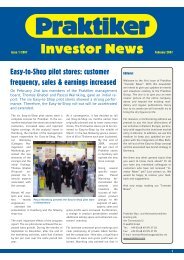Praktiker Bau- und Heimwerkmärkte Holding AG, Kirkel
Praktiker Bau- und Heimwerkmärkte Holding AG, Kirkel
Praktiker Bau- und Heimwerkmärkte Holding AG, Kirkel
Create successful ePaper yourself
Turn your PDF publications into a flip-book with our unique Google optimized e-Paper software.
Page 20<br />
ports from Asia invoiced in dollars are hedged against exchange rate fluctuations vis-à-vis the euro.<br />
However, as the majority of products sold abroad are sourced from suppliers based in the countries<br />
concerned, a form of “natural hedging” in respect of the given products occurs.<br />
In spite of all the hedging measures taken, a not inconsiderable residual risk still remains as foreign<br />
currency risks arising from the valuation of balance sheet positions cannot be hedged at an economically<br />
viable cost. The resultant impact on earnings is reported <strong>und</strong>er the item “currency gains and<br />
losses” as part of net financial income. The gains and losses concerned are income or expense items<br />
related to year-end valuations and predominantly have no impact on cash. In 2007, this type of expense,<br />
which was above all attributable to the devaluation of the Romanian lei, accounted for a low,<br />
single-digit million euro amount.<br />
Financial risks<br />
The finance division’s duties include the identification, valuation and hedging of financial risks. Within<br />
the group there are no credit risks of any significance. Sales to customers are transacted in cash or<br />
via standard credit cards. Cash deposits or derivative financial instruments with positive market values<br />
with financial institutions are subject to varying maximum limits, which are based on the ratings published<br />
by international agencies.<br />
The finance division also acts as a cash consolidator for the entire <strong>Praktiker</strong> Group. As a result, its<br />
duties include ensuring that sufficient liquidity is available at all times. Surplus liquidity is invested in<br />
short-term money market transactions with reputable European credit institutions. For the purpose of<br />
bridging any short-term liquidity bottlenecks, <strong>Praktiker</strong> Group has access to a consortium loan of 200<br />
million euros. As such, the management is of the opinion that the liquidity risk is practically hedged in<br />
its entirety.<br />
General business risks<br />
The <strong>Praktiker</strong> Group <strong>und</strong>ertakes preventive action in terms of general business risks via its constant<br />
observation of changes in supply and demand in the individual markets. This is firmly anchored in its<br />
standard reporting system in the form of daily reports on the sales in all markets. In this way, trends in<br />
demand are identified at an early stage. Items subject to declining demand or sharply enhanced competition<br />
can be withdrawn from the product ranges on offer and replaced with such items as enjoy<br />
greater popularity among customers. In this process, regional differences in customer preferences are<br />
taken into account and product ranges are adjusted to meet specific needs on a per-country basis. Put<br />
in a nutshell – outlets and product ranges are subject to ongoing optimisation.<br />
In Germany, the consequences of this strategy are clearly evident. After all, the new ‘Easy-to-Shop’<br />
concept was developed against the backdrop of changes in customer requirements. Fewer items but a<br />
clear price and brand hierarchy, improved guidance systems in the stores and a self-explanatory presentation<br />
of products all help to enable the customer to shop faster and more conveniently. This concept<br />
had already been implemented in 66 <strong>Praktiker</strong> stores as of the end of the year <strong>und</strong>er review.



